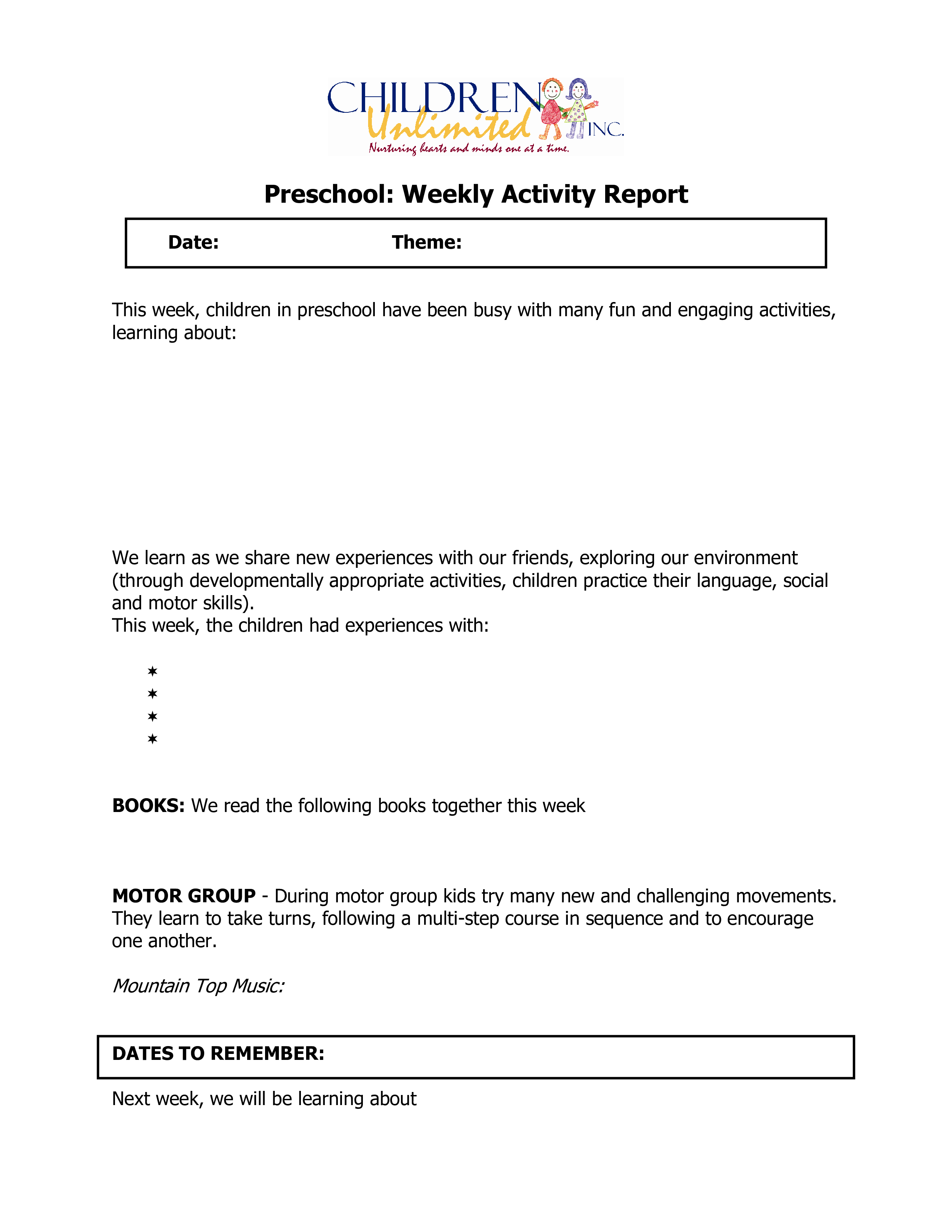Preschool Weekly Activity Schedule
Save, fill-In The Blanks, Print, Done!

Download Preschool Weekly Activity Schedule
Adobe Acrobat (.pdf)- This Document Has Been Certified by a Professional
- 100% customizable
- This is a digital download (132.09 kB)
- Language: English
- We recommend downloading this file onto your computer.
How to make a preschool weekly activity schedule? What is the meaning of a weekly activity schedule? For your convenience, we have created a sample template for you to use. It includes all the necessary information, such as the date, time, and name of the activity. It is easy to use and customize to fit your needs. Download this sample schedule template that will perfectly suit your needs!
A Preschool Weekly Activity Schedule is a plan that outlines the activities and lessons that will take place in a preschool or childcare setting over the course of a week. This schedule is typically designed to provide young children with a structured and engaging learning environment while also allowing for free play and exploration. The specific activities and schedule can vary depending on the educational philosophy of the preschool, the age of the children, and the goals of the program.
Here are some common elements you might find in a preschool weekly activity schedule:
- Circle Time: This is often how the day begins, with activities like group discussions, songs, stories, and calendar time. Circle time helps children develop social and communication skills.
- Learning Centers: Preschools often have various learning centers that children can rotate through during the week. These centers might include art, science, math, language, and sensory play areas. The activities in each center are designed to promote specific skills and knowledge.
- Outdoor Play: Outdoor time is crucial for children's physical development and allows them to expend energy and explore the natural world. Weather permitting, preschools often schedule daily outdoor playtime.
- Storytime: Reading is an essential component of early childhood education. Storytime involves reading books to the children and discussing the stories to enhance language and comprehension skills.
- Creative Arts: Activities like painting, drawing, and craft projects help children develop fine motor skills, creativity, and self-expression.
- Music and Movement: Preschools may incorporate music and movement activities to encourage physical coordination and a sense of rhythm.
- Snack and Lunchtime: Preschools provide meals and snacks, and this time is often used for teaching table manners, social interactions, and healthy eating habits.
- Rest or Nap Time: Young children need rest during the day, so a schedule may include a designated rest or nap time.
- Free Play: Unstructured playtime allows children to choose activities and interact with their peers independently, fostering creativity and social skills.
- Special Activities or Field Trips: Some days may include special events, visitors, or field trips to enhance the learning experience.
The specific content and structure of a Preschool Weekly Activity Schedule can vary from one preschool to another and may also be tailored to the age group of the children. The goal is to create a balanced and engaging environment that promotes learning and development in various domains, including cognitive, social, emotional, and physical aspects of a child's growth. It's important for parents and caregivers to understand the schedule and be involved in their child's preschool experience.
DISCLAIMER
Nothing on this site shall be considered legal advice and no attorney-client relationship is established.
Leave a Reply. If you have any questions or remarks, feel free to post them below.
Daily Report Sheets For Preschool
How do you create a kindergarten schedule or write a daily report for a preschool? Check out these preschool templates here.
Read moreRelated templates
Latest templates
Latest topics
- GDPR Compliance Templates
What do you need to become GDPR compliant? Are you looking for useful GDPR document templates to make you compliant? All these compliance documents will be available to download instantly... - Google Docs Templates
How to create documents in Google Docs? We provide Google Docs compatible template and these are the reasons why it's useful to work with Google Docs... - IT Security Standards Kit
What are IT Security Standards? Check out our collection of this newly updated IT Security Kit Standard templates, including policies, controls, processes, checklists, procedures and other documents. - Letter Format
How to format a letter? Here is a brief overview of common letter formats and templates in USA and UK and get inspirited immediately! - Google Sheets Templates
How to work with Google Sheets templates? Where to download useful Google Sheets templates? Check out our samples here.
cheese

